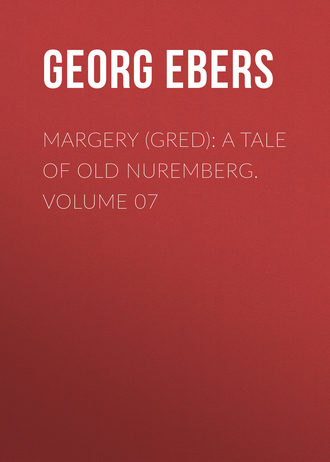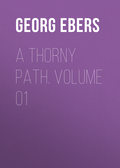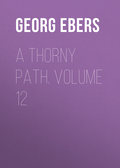
Georg Ebers
Margery (Gred): A Tale Of Old Nuremberg. Volume 07
Hereupon I showed her—and my eyes overflowed—that his oath stood forth as against her oath, and that one was as weighty as the other in the sight of the Most High.
"Set aside that cruel vow, my dear aunt," cried I, "I will make any pilgrimage with you, and I know full well that no penance will seem overhard to you."
"No, no, of a surety, Margery, no!" she replied with a groan. "And the Chaplain said the like to me long ago; and yet I feel in my heart that you and he are in the wrong. An oath sworn by Christ's wounds!—Moreover I am the elder and his mother, he is the younger and my son. It is his part to come to me, and if he then shall make a pilgrimage it shall be to Rome and the Holy Sepulchre. He has time before him in which to do any penance the Holy Church may require of him. I—I would lay me on the rack only to see him once more, I would fast and scourge myself till my dying day; but I am his mother, and he is my son, and it is his part to take the first step, not mine who bore him."
How warmly I urged her again and again, and how often was she on the point of yielding to her heart's loud outcry! Yet she ever came back to the same point: that it ill-beseemed her to be the first to put forth her hand, albeit her every feeling drove her to it.
The letters sent to Gotz had reached him through a merchant's house in Venice. This his parents knew, and they had long since charged Kunz to inquire where he dwelt. Yet had his pains been for nought, inasmuch as the banished youth had forbidden the traders to tell any one, whosoever might ask. Howbeit my uncle had implored his son in many a letter to mind him of his mother's sickness, and come home; and in his answers Gotz had many a time given his parents assurance of his true and loving devotion; yet had he kept his oath, and tarried beyond seas. These letters likewise did my aunt show me, and while I read them she charged me to make it my duty not to quit that merchant's house and to take no rest until I had learned where her son was dwelling: saying that what an Italian might deny to a man a fair young maiden might yet obtain of him.
It was not yet dusk when Master Ulsenius came and broke off our discourse. He had come forth in part to see Eppelein, and presently, when a lamp was brought, as we stood by the faithful lad he called me by name, and then Uncle Conrad, and said that albeit he was weary of limb he was easy and comfortable; that he felt a smart now and then, and in especial about his neck, yet that troubled him but little, inasmuch as that it plainly showed him that the thought which had haunted him, that he was really killed and in a darksome hell, was but a horrible dream.
Then when he had spoken thus much, with great pains, his pale face turned red on a sudden, and again he asked, as he had many times in his sickness, where was his master's letter. Hereupon I hastily told him that we had hunted down the robbers and rescued it, and it was a joy to see how much comfort and delight this was to him. And when he had swallowed a good cup of strong Malvoisie, he could sit up, and enquired if the Baron von Im Hoff were minded to satisfy the Sultan's over-great demand. And to this I replied, to give him easement, that we had good reason to hope so. And was his mind now clear enough to enable him to remember how great a sum was demanded for ransom?
He smiled craftily, and said that even as a dead man he could scarce have forgotten that, by reason that he had muttered the words to himself on his way oftener than any old monk mumbles his Paternoster. And when Uncle Conrad laughed and bid him jestingly repeat it, he said, like a school boy who is sure of his task: "For Master Herdegen Schopper, slave of the said unbeliever Abou Sef—[Father of the scimitar]—in the armory of Sultan Burs Bey in the Castle of Cairo, a ransom is demanded of twenty-four thousand Venice sequins. George—Christina! Death and fire on the head of the misbelieving wretch!"
When we heard this we all believed that he had of a surety been wrong as to the sum or the coin, likewise we thought his last strange words were due to a wandering mind; howbeit, we were soon to learn that verily his tidings were the truth. He forthwith went on to say with some pains that his master had made him to use a means by which he might remember the number from all others in case, by ill-hap, the letter should be lost. And on this wise he gave us to know for certain that the vast sum demanded was not an error on his part. It was to this end that he had stamped on his memory the names of Saint George and Saint Christina, whose days in the calendar are on the 24th of April and the 24th of July, and the number of thousands named for the ransom was likewise four and twenty. Also Herdegen had bid him think of twice the twelve apostles, and of the twenty-four hours from midnight till midnight again. It would seem beyond belief to most folks, he said, yet it was indeed twenty-four thousand, and not hundred, sequins which that devilish Sultan has asked, as indeed we must know from the letter. Presently, when he had rested a while, we made him tell us more, and we learned that the Sultan had been minded to set Herdegen free without price, and he would have had him led forthwith to the imprisoned King Janus of Cyprus, to whom he thought he might thus do a pleasure, but that Ursula Tetzel, who was standing by with her husband, had whispered to the Sultan that she would not see him robbed of a great profit forasmuch as that yonder Christian slave—and she pointed to my brother—was of one of the richest families of her native town, who could pay a royal ransom for him and find it no great burthen; and that the same was true of Sir Franz, who was likewise to have been set free. Hereupon the Sultan, who at all times lacked moneys, notwithstanding the heavy tribute he levied on all merchandise, commanded that Herdegen and the Bohemian should be led away again and then he asked this overweening ransom. Then Ursula took upon herself of her own free will to send tidings of the Sultan's demands to the slaves' kith and kin, and of her deep malice had never done so.
That evening we might not hear how and on what authority Eppelein knew all this, for much talking had wearied him. All we could then learn was that it was Ursula, and none other, whom the lad would still speak of as the She-devil, who had plotted the snare which had well nigh cost my other brother his life. Yet had he left him so far amended that he, Eppelein, would be glad to be no worse.
Albeit these tidings of Kunz were good to cheer us, our hopes of ransoming Herdegen were indeed far away, or rather in the realm of nevermore; even if my grand-uncle were possessed of so great a sum, it was a question whether he would be willing to pay it; and as for us, we could never have raised it at the cost of all our fortune. At that time the Venice sequin and Nuremberg gulden were not far asunder in value, and what the sum of twenty-four thousand gulden meant any man may imagine when I say that, no more than twelve years sooner, the liberty of coining for the whole city was granted by the Emperor Sigismund to Herdegen Valzner for four thousand Rhenish gulden; and that Master Ulman Stromer purchased his fine dwelling-house behind the chapel of Our Lady, with the houses pertaining thereto, and his share in the Rigler's house for two thousand eight hundred gulden. For such a sum as was demanded a whole street in Nuremberg might have been sold; nay, the great castle of Malmsbach on the Pegnitz would lately have been bought by the city for a thousand Rhenish gulden, but that Master Ulrich Rummel, whose it was, would not part with it. And we were now required to pay the price of two dozen such strongholds! It was indeed an unheard-of and devilish extortion; and when Kubbeling came to hear of it he turned his wild-cat- skin pocket inside out, and fell to raging and storming.
Aunt Jacoba turned pale when she heard the great sum named, and she likewise was of opinion that old Im Hoff, who had of late been spending much money in vows and foundations, would never give forth so vast a sum. The richest families in Nuremberg might be moved to pay fifty, and at the most a hundred gulden for the ransom of a Christian and a fellow- countryman, but if even twenty might be found so open-handed, which was not to be looked for, and if my godfather Christian Pfinzing, and the Waldstromers, and the Hallers should do their utmost, and we should give the greater part of all our possessions, we could scarce make it up to twenty-four thousand sequins if my grand-uncle did not help.
Thus after a day of hope came a first night of despairing, and many another must follow, and I was to know once more that misfortunes never come singly.
I had hoped of a surety to speak with Eppelein once more or ever I departed at noon, and to ask him of many matters; howbeit, when I went up to his chamber Master Ulsenius met me with a face of care and told me that the poor fellow was again wandering in his wits. When I presently went forth from the house, a bee-keeper's waggon was slowly moving from the court-yard. The housewife waved her hand, and from beneath the tilt the face of Dame Henneleinlein looked at me with a scornful grin. Since her evil demeanor at the Pernbarts' they had closed their house on her, and when she had dared once to go to the Schopperhof, thence likewise had she been shut out, and thus she felt no good-will towards us. Now when I enquired of the housekeeper what might be the end and reason for this visit, the woman hid beneath her apron a jar of honey which the old dame had given her as a sweetmeat for the children; and she gave me to understand that the worthy lady had come forth to the forest to collect her widow's dues of honey, and had tarried on her way for a little friendly discourse. But methought that "little" must have had some strange meaning, inasmuch as the housewife's withered cheeks were of the color of a robin's breast. Hereupon I threatened her with my finger, and enquired of her whether she had not betrayed more to the evil-tongued old woman than she ought, but she eagerly denied the charge.
My ride home to the town after noon was not altogether a pleasant one, by reason that icy rain poured from heaven in streams, mingled with snow. The further we went the worse the roads were, and yet when my companions turned at the city-gate to ride homewards again, a strange, fierce confidence came upon me. Whether it were that the wet which ran off from me and my stout horse had singularly refreshed me, or whether it was the steadfast purpose I had set as I rode along, to risk my all to the end that I might redeem my brethren, I know not. But to this hour I mind me that, as I rode in through the dark streets, my heart beat high with contentment, and that had I been such another man as Herdegen I might have been ready enough to pick a quarrel with the first who should have said me nay.
Thus I fared on past my grand-uncle's house; there I beheld from afar a lighted lantern, as it were a glow-worm at midsummer, moving along the street, and when I perceived that it was none other than old Henneleinlein who carried it, I put my horse, which till now had been wading through the mire step by step, to a swift gallop, as fast as he might go, and the servingman behind me, passing close by her. And what simple glee was mine when our horses splashed the old woman from head to foot, inasmuch as I wist for certain that she could have stolen to my grand-uncle's house at that late hour to no end but to reveal whatsoever she might have picked up from her friend and gossip at the forest-lodge.
Thus I reached home in better cheer than I had hoped; and when Susan told me that Cousin Maud was in the kitchen ordering the supper, I crept up- stairs, hastily changed my wet raiment, sent forth my man to tell Ann that she was to come to me, and then, in the best chamber, I fetched forth the elecampane wine which I had ever found the best remedy when my cousin needed some strength. Nor was my care in vain; for when I had told her, little by little, as it were in small doses, all the tidings I had heard yesterday, and ended with the great and cruel price demanded by the Sultan, she shrieked aloud and clasped her hands to her heart in such wise that I was verily in great fear. Then the elecampane wine did good service; yet was it not till she had drunk of it many times that her tongue spoke plainly again. And presently, when she was able to wag it, it went on for a long time with no pause nor rest, in sheer impatience and godless railing.
When she had thus relieved her mind, she began pacing up and down the floor on one and the same plank, like a lion in its cage, and to call to mind, one by one, all our earthly possessions, and to reckon at how we might attain to selling it for gold. The whole sum was not much to comfort us, for her worldly estate, like that of the Waldstromers, was in land, and in these days of peril from the Hussites it was hard enough to sell landed property, and her best portion was in meads and pasture and a few vineyards near Wurzburg.
It was from the first her fixed intent, as though it were a matter of course, to give everything she had, down to her jewels; and whereas she conceived, and rightly, that for Herdegen's sake I should be like-minded, she asked me no questions but added to it in her mind, the Schopper jewels which had come to me from my father and mother, and then began to count and reckon. It might perchance come to so much as eleven thousand sequins if we sold all we had to sell; yet our inheritance lay in Chancery, and, as she knew full well, not a farthing thereof might be given up but with the full and well-proven authority of Herdegen and Kunz. Nor might I even have that which was mine own, by reason that our inheritance had never been shared, and our houses and lands had not been valued at a price. Thus I must have long patience or ever I came by my own; all the more so whereas the gentlemen of the Chancery were required to answer for the wealth of orphans in their keeping with their own.
Hereupon we again thought of my grand-uncle, and Cousin Maud declared that he would of a certainty be ready to pay half the required ransom for a purpose so pleasing in the eyes of God, and that the other half might be raised by the help of our friends. Then she was fain to think of the future. And the longer she did so, even when Ann had come to us and had been told all our tidings, the better cheer she showed; nay, it might have been conceived that it would be a far more easy and delightful matter to live in narrow poverty than in superfluous riches, and thereupon she put me in mind how that many a time, when the men-folks were away from home, she and I had been content to make good cheer with some sweet porridge, and had very gladly dined without flesh-meat, which was so costly. We should be free from the vexation of so many serving- men and wenches; and whereas of late she had been forced to turn Brigitta out of the house, had she not herself scarce escaped a fever from sheer worry of mind. Susan would ever be true to us; she would be ready to share our poverty with us, and the unresting up-stairs and down had long been a torment to her old feet.
The Magister was a well-disposed man, and if he found it an over-hard matter to depart from us we might very gladly let him board with us, if he could be content to live with us in her little house in the Grassmarket, in which Rosmuller now dwelt. There was no lack of good home-spun cloth in Nuremberg; nay, and if we should never again have new garments that would be all the better for our souls' health. As for me, I might perchance have fewer suitors, but if one should pay his court to me, he would have no thought but for Margery, and how she looked and moved. Nay, take it for all in all, we owed much thanks to Ursula and the reprobate heathen Sultan if we were by their means brought low from ill-starred wealth and ease to God-pleasing poverty.
Ann was far less horror-struck at the fearful sum of the ransom than we had been, by reason that she was ever possessed by the assurance that Heaven had created her and Herdegen for each other, and would bring them together at last.
Moreover she had good cause to build her hopes on my grand-uncle's help. In a letter from the Cardinal to her he said that now, as of old, he could only counsel her to follow the voice of her heart; that he would put no hindrance in the way of our departing, albeit he urgently prayed us to put it off till after his homecoming, which should now be in a short space. She was to let Baron Im Hoff know that he was ready to do his will, albeit he hoped at his coming to find him in mended health. She had forthwith carried these good tidings to my grand-uncle, and they had so uplifted and comforted his heart that verily it seemed as though my lord Cardinal's good hopes might find fulfilment. And this very morning she had seen him, and a right strange mind had come over him; he had enquired of her straitly, and as though it was to him a great matter, all that she could tell him of my lord Cardinal's way of life, of the duties of his office and the like; and whereas she answered him that of all these matters she knew but little, yet had she heard from his own mouth that his eminence was bound in thankfulness to his Holiness the Pope, by reason that he had made him to be high Almoner of the Papal treasury and thus put it into his power to do many good works; and this she deemed, had brought great easement to my granduncle. Then when she rose to depart from him, he had sent his serving-man to bid Master Holzschuher, the notary, to come to him, and to bring with him two trustworthy witnesses duly sworn to secrecy. As he bid her farewell he had laughed, and whispered to her that his Eminence the Cardinal would be well-content with old Im Hoff, yea, and she likewise, and her lover.
All this gave us matter for thought, and also gave us good heart; only it weighed upon our souls that our departing was not to be yet for some weeks.







